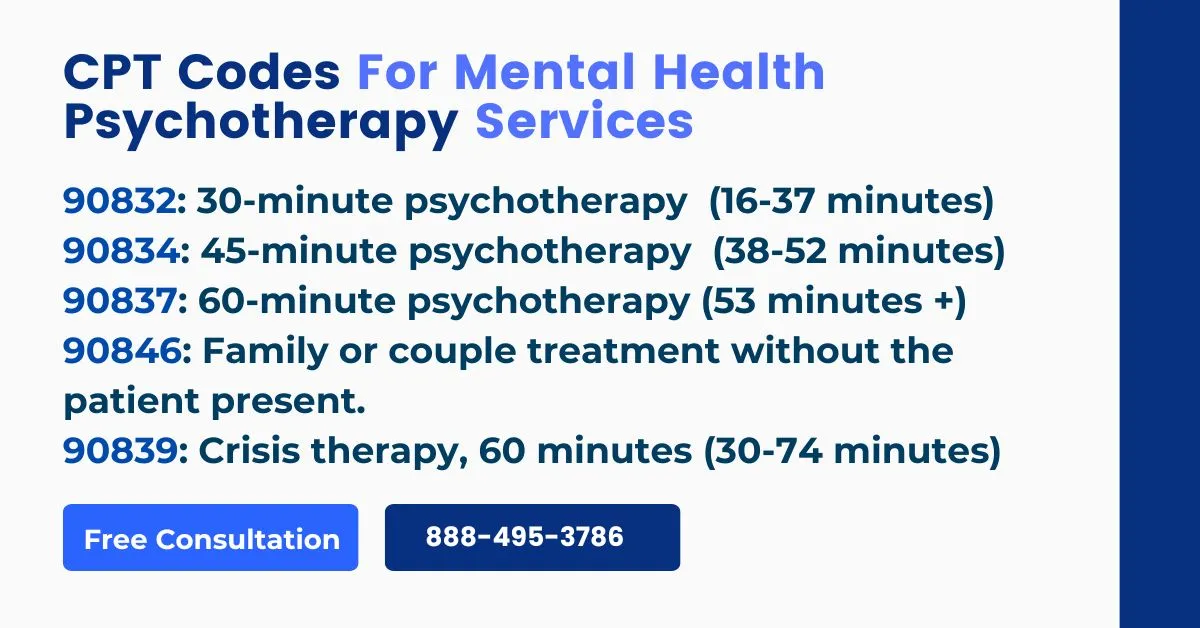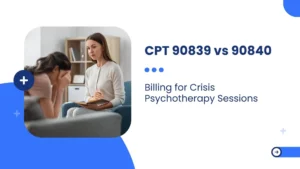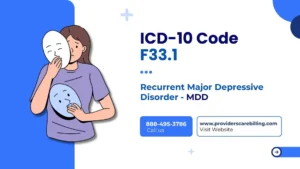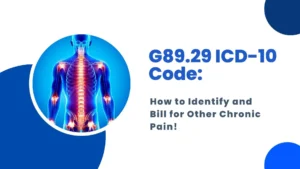CPT codes for mental health Practices are important for anyone working in this field. These codes can help track the treatments provided, which in turn makes medical billing and documentation easier and more accurate.
By using the right codes, therapists, psychologists, and billing professionals will make sure that they get paid correctly for their services. Furthermore, the understanding of these codes helps reduce mistakes that can lead to billing issues or delays.
If you’re a mental health professional or someone who is handling billing, knowing the basics of CPT codes is key to keeping everything smooth. In this blog post, we are going to disclose some essential codes you need to know.
What are the CPT Codes?
CPT, which stands for Current Procedural Terminology, is a standardized set of medical codes that is maintained by the American Medical Association (AMA). These are the five-digit numeric codes that are used to describe a wide range of medical services, from surgeries and radiology to psychotherapy sessions.
It’s important to understand that CPT codes are different from diagnosis codes like ICD-10 or F-codes, which are used for medical billing and insurance claims.
These codes are helpful in documenting treatments, which allows for clear communication between healthcare professionals, insurance companies, and medical billing departments.
Importance of CPT Codes for Mental Health Practices
Let’s go deeper and find out how CPT codes are essential in mental health services:
Accurate Medical Billing
Most importantly, CPT codes make it easy for mental health practitioners to bill for their services. By using the correct codes, they can make sure that they’re paid properly for the treatments and the therapy they provide.
Insurance Claims
CPT codes are crucial when filing insurance claims. With the right CPT codes, insurance companies can quickly understand what services they have provided, which helps with smoother and faster claim approvals.
Avoiding Errors
Error, whether accidental or not, can directly affect how the insurance company pays for services. Using the right CPT codes will help you prevent mistakes in medical billing, which usually lead to delayed or denied payments. Furthermore, it will reduce the chances of insurance audits.
Compliance With Regulations
CPT codes help practitioners comply with healthcare regulations. Following the coding guidelines ensures that everything is done correctly and legally.
What are the Types of Mental Health CPT Codes?
Mental health CPT codes that are used by therapists are divided into 4 main categories. These categories will help you make it easier to find the code you need:
1- Psychiatric Diagnostic Interviews
These codes are used for initial evaluations with a patient to assess their mental health condition.
- 90801 – Standard Psychiatric diagnostic interview
- 90802 – Interactive Psychiatric diagnostic interview (for patients who need extra communication support).
2- Psychiatric Therapeutic Services
These codes apply to various types of psychotherapy aimed at helping patients manage their mental health.
- 90804-90809: Psychotherapy focused on insight, behavior change, or emotional support.
- 90810-90815: Interactive psychotherapy (for patients needing more engagement during therapy).
3- Family Psychotherapy
These codes cover therapy sessions involving family members, with or without the patient.
- 90846: Family therapy without the patient present.
- 90847: Family therapy with the patient present.
- 90849: Therapy for multiple families together in a group.
4- Group Psychotherapy
These codes are for therapy sessions held in groups, either with or without family members.
- 90853: Group therapy (for non-family groups).
- 90857: Interactive group therapy (for more involved group sessions).
Common CPT Codes for Mental Health Psychotherapy Services
Although there are many CPT codes that apply to mental health services in general, therapists often use only a small group of these codes in everyday practice. By understanding the most frequent mental health CPT codes, you’ll be better able to choose the appropriate code for each service you provide. As a therapist, you will most likely encounter the following codes.
Diagnostic Evaluation and Intake CPT Codes
This code is used for the initial psychiatric evaluation of a new client. It focuses on assessing the patient’s mental health without including any medical services. This exam covers the chief complaint, the history of the present illness, family and psychosocial background, and a complete mental status evaluation. If the initial evaluation includes medical services, you would instead use code 90792.
- 90791: Psychiatric Diagnostic Evaluation (typically covered only once per client).
Outpatient Mental Health Therapy CPT Codes
These codes apply to individual, family, and group therapy sessions based on the length and type of session.
- 90832: 30-minute psychotherapy session (It lasts between 16-37 minutes).
- 90834: 45-minute psychotherapy session (lt lasts between 38-52 minutes).
- 90837: 60-minute psychotherapy session (lt lasts 53 minutes or more).
- 90846: Family or couple treatment without the patient present.
Details: It is a therapy session in which the client’s family is present, but the client is not.
- 90847: Family or couples therapy in which the patient is present.
Details: Group psychotherapy, excluding multiple-family groups, involves the interactions between group members to explore and address each person’s mental health concerns. The therapist observes the group’s dynamics and uses them to help modify the behaviors and attitudes of the individual members. This code is used to report services provided to every participant during each session. Unlike some other therapy sessions, this one is not time-based.
- 98968: Telephone therapy (non-psychiatrist). It is limited to 3 units/hours per session.
Outpatient Mental Health Crises Care CPT Codes
These codes are used for crisis-based therapy and can include additional time if necessary.
- 90839: Crisis therapy session, 60 minutes (duration: 30-74 minutes).
- +90840: An extra 30 minutes of crisis therapy (used with 90839 for sessions longer than 75 minutes).
Additional CPT Codes for Behavioral Health
Here are some additional CPT codes commonly used in behavioral health services:
- +90785: This is an add-on code for Interactive Complexity. It’s used when extra factors complicate communication, like dealing with non-verbal patients.
- 90404: A unique CPT code used by Cigna and MHN for Employee Assistance Program (EAP) sessions.
- 96101: This code is for psychological testing, including the interpretation and reporting done by a psychologist. It’s billed per hour.
- 90880: This code covers hypnotherapy sessions, with a limit of 10 units or hours for each application.
- 90876: Used for biofeedback therapy, a method that helps patients control bodily functions like heart rate and muscle tension.
- 90849: This code is for multiple-family group therapy, where more than one family participates in a group session.
- 90845: It is used for psychoanalysis, a therapy method that helps patients explore their unconscious thoughts and feelings.
Common Add-on CPT Codes for Mental Health Services
Here is a list of frequently used add-on codes for routine outpatient mental health billing. These codes are added to the main CPT codes to show extra services provided during a session.
- 99355: It is for sessions that need more time, adding the first 30 to 74 minutes after the initial hour.
- 90840: Adds 30 minutes of psychotherapy for crises. They are only used with 90839.
- 90833: Adds 30 minutes of psychotherapy when, for example, a psychiatrist evaluates medication and then has a 30-minute session.
- 90836: Adds 45 minutes of psychotherapy, like when a Clinical Nurse Specialist checks medication response and follows it up with a 45-minute session.
- 90785: This is for interactive complexity, like play therapy with dolls or toys. It shows that the treatment is more complex but is not a billable expense.
- 90863: It is used for managing medications after a therapy session.
- 99050: Applied when services are provided outside of regular office hours or on days when the office is usually closed.
- 99051: It’s for services that are provided during regularly scheduled evening, weekend, or holiday hours.
- 99354: This code adds extra time after the first 74 minutes of a session. Use this code if the session lasts at least 90 minutes for 90837 or 80 minutes for 90847.
Outpatient Psychiatry CPT Codes
Here are some commonly used CPT codes for outpatient psychiatry, covering evaluations, client intake, and office visits for new and established patients.
- 90792: This code is for a psychiatric diagnostic evaluation with medical services, typically used once per client.
- Codes for Established Patient Office Visits:
- 99211: A brief 5-minute follow-up visit for an established patient.
- 99212: A 10-minute follow-up visit for an established patient.
- 99213: A 15-minute follow-up visit for an established patient.
- 99214: A 25-minute follow-up visit for an established patient.
- 99215: A 40-minute follow-up visit for an established patient.
- Codes for new patient office visits:
- 99201: A 10-minute evaluation of a new patient.
- 99202: A 20-minute initial patient evaluation.
- 99203: A 30-minute evaluation of a new patient.
- 99204: A 45-minute evaluation of a new patient.
- 99205: A 60-minute new patient evaluation.
- Telephone Therapy:
- 99443: This code is used for telephone therapy provided by a psychiatrist, with a limit of 3 hours per application.
These codes help organize and document different types of psychiatry services based on time and patient status.
Simplified CPT Coding for Therapy
CPT coding for therapy doesn’t have to be complicated. While there are around 8,000 total CPT codes, only 24 are specific to psychotherapy and mental health services. To make it even easier, most therapists use just a handful of these 24 codes on a regular basis. Although the overall CPT codes change every year, psychotherapy codes rarely change. The last major updates were in 2019, 2013, and before that, 1998.
To stay up to date without the hassle of remembering all the codes, consider using a reputable medical billing service such as Providers Care Billing, LLC, which handles everything for you.
Behavioral Health CPT Add-on Codes
A CPT add-on code defines a service that is given in addition to the main service. These codes are linked to certain CPT codes and cannot be used alone.
For example, the mental health CPT add-on code for interactive complexity (+90785) may be used during a diagnostic session (90791, 90792) or regular therapy (90832, 90834, 90837) but not during crisis therapy (90839).
Add-on codes that are marked by a “+” (like +90840 for extra crisis therapy time) are listed separately on CMS 1500 forms.
Using add-on codes is crucial to fully describe the services provided and ensure you maximize billing for each session. Providers Care Billing LLC’s billing service helps mental health providers manage this for every appointment.





